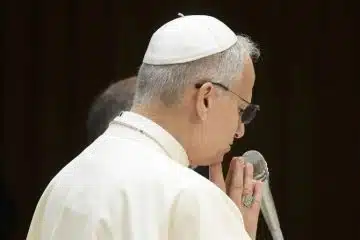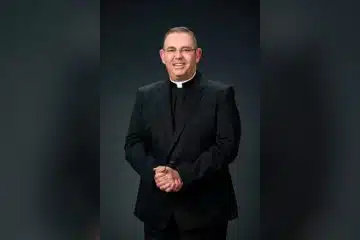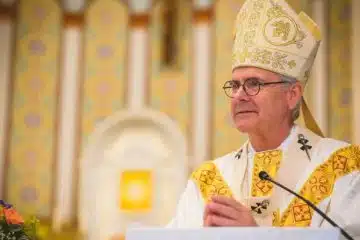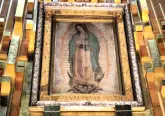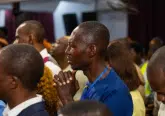U.S., Venezuelan bishops: Ending temporary protected status for migrants ‘counterproductive’
Caracas, Venezuela, Feb 8, 2025 / 08:00 am
The bishops of the United States and Venezuela are both opposed to the Trump administration’s looming elimination of temporary protected status (TPS) for recent Venezuelan immigrants.
The United States Department of Homeland Security (DHS) confirmed this week that it will eliminate the extension that the Biden administration announced in January that allowed Venezuelan immigrants to access TPS until October 2026.
TPS is a temporary immigration benefit granted to foreign nationals of a qualifying country. Under it, immigrants can legally remain in the United States and get work permits. The measure was originally announced for Venezuela in 2021 and then extended in 2022, 2023, and 2024.
Following the DHS decision, this immigration benefit will expire on April 7. The U.S. government estimates that approximately 350,000 Venezuelan immigrants were eligible for TPS under the Biden administration’s 2023 renewal of the program.
The DHS, headed by former South Dakota Gov. Kristi Noem, assures that although certain conditions that led to the renewal of TPS for Venezuela in 2023 “can continue,” the department considers that in the South American country “there are notable improvements in several areas such as the economy, public health, and crime that allow these citizens to be safely returned to their country of origin.”
Noem considers, after analyzing the issue with other government agencies, that the elimination of TPS for Venezuelan immigrants is necessary “because it is contrary to the national interest” to allow Venezuelan citizens to temporarily settle in the United States.
TPS, the Trump administration notes, has allowed a large number of immigrants to cause “difficulties in local communities,” especially immigrants belonging to the Venezuelan criminal gang known as Tren de Aragua, accused by the United States government of “sex trafficking, drug smuggling, shootouts with police, kidnappings, and exploitation of immigrants.”
For the DHS secretary, allowing Venezuelan citizens to remain in the United States under the protection of TPS “does not defend the fundamental interests” of the country, nor does it “put American interests first.”
“The foreign policy interests of the United States, especially in the Western Hemisphere, are best served and protected by reducing policies that facilitate or encourage illegal and destabilizing migration,” DHS said.
U.S. and Venezuelan bishops oppose the move
The Catholic bishops of the United States and Venezuela do not share this reasoning. In a statement to ACI Prensa, CNA’s Spanish-language news partner, Chieko Noguchi, spokesperson for the United States Conference of Catholic Bishops (USCCB), described the Trump administration’s measure as “counterproductive.”
Noguchi said the elimination of TPS for Venezuela does not reduce the pressure on American communities and urged the Trump administration “to consider the adverse impact this measure will have on citizens and noncitizens alike.” She also called on Congress to work “on a meaningful reform of the immigration system,” which contributes to “well-regulated borders and humane and orderly immigration.”
“Ending this temporary legal protection that allows people to work, pay taxes, and contribute to our society will only lead to further disruption and would appear to risk diverting the attention of law enforcement efforts from legitimate threats to public safety,” Noguchi said.
For their part, the Venezuelan bishops did not hesitate to express their displeasure with the decision by the Trump administration.
Bishop José Antonio Da Conceição, secretary-general of the Venezuelan Bishops’ Conference, told ACI Prensa that rescinding TPS “gives a large contingent of people who wanted to comply with the laws of the United States illegal status.”
“The fairest thing was to evaluate each case and take legal measures,” the bishop of Puerto Cabello pointed out. He also noted that the Church asks governments to address the phenomenon of migration “with solidarity and respect for the rights of migrants.”
Although the doctrine of the Church, he continued, guarantees that sovereign states can safeguard their territory, “this does not justify the inhuman and persecutory treatment of immigrants.”
“Pope Francis has said that migrants are accompanied by God, who guides them and gives them hope. All inhuman treatment against them is a sin that cries out to heaven,” Da Conceição said.
The bishop noted that the Venezuelan bishops will hold their 123rd Ordinary Plenary Assembly next week, from which a pastoral exhortation will emerge that will address the issue of Venezuelan migration and other urgent issues.
This story was first published by ACI Prensa, CNA’s Spanish-language news partner. It has been translated and adapted by CNA.


